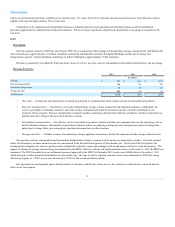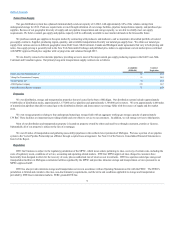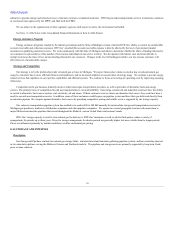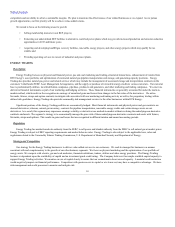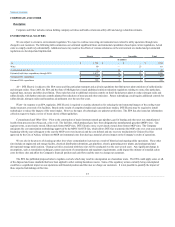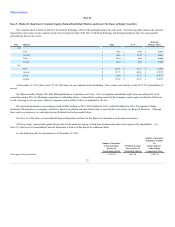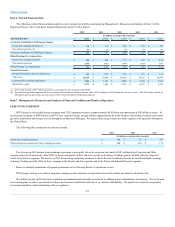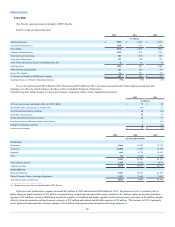DTE Energy 2012 Annual Report Download - page 20
Download and view the complete annual report
Please find page 20 of the 2012 DTE Energy annual report below. You can navigate through the pages in the report by either clicking on the pages listed below, or by using the keyword search tool below to find specific information within the annual report.
Table of Contents
our plan assets, we could be required to fund our plans with significant amounts of cash. Such cash funding obligations could have a material impact on our
cash flows, financial position, or results of operations.
Our ability to access capital markets is important. Our ability to access capital markets is important to operate our businesses. In the past, turmoil in
credit markets has constrained, and may again in the future constrain, our ability as well as the ability of our subsidiaries to issue new debt, including
commercial paper, and refinance existing debt at reasonable interest rates. In addition, the level of borrowing by other energy companies and the market as a
whole could limit our access to capital markets. Our long term revolving credit facilities do not expire until 2016, but we regularly access capital markets to
refinance existing debt or fund new projects at our utilities and non-utility businesses, and we cannot predict the pricing or demand for those future
transactions.
Construction and capital improvements to our power facilities and distribution systems subject us to ris k. We are managing ongoing and planning
future significant construction and capital improvement projects at multiple power generation and distribution facilities and our gas distribution system. Many
factors that could cause delays or increased prices for these complex projects are beyond our control, including the cost of materials and labor, subcontractor
performance, timing and issuance of necessary permits, construction disputes and weather conditions. Failure to complete these projects on schedule and on
budget for any reason could adversely affect our financial performance and operations at the affected facilities and businesses.
Our non-utility businesses may not perform to our expectations. We rely on our non-utility operations for an increasing portion of our earnings. If our
current and contemplated non-utility investments do not perform at expected levels, we could experience diminished earnings and a corresponding decline in
our shareholder value.
Our participation in energy trading markets subjects us to risk. Events in the energy trading industry have increased the level of scrutiny on the energy
trading business and the energy industry as a whole. In certain situations we may be required to post collateral to support trading operations, which could be
substantial. If access to liquidity to support trading activities is curtailed, we could experience decreased earnings potential and cash flows. Energy trading
activities take place in volatile markets and expose us to risks related to commodity price movements. We routinely have speculative trading positions in the
market, within strict policy guidelines we set, resulting from the management of our business portfolio. To the extent speculative trading positions exist,
fluctuating commodity prices can improve or diminish our financial results and financial position. We manage our exposure by establishing and enforcing
strict risk limits and risk management procedures. During periods of extreme volatility, these risk limits and risk management procedures may not work as
planned and cannot eliminate all risks associated with these activities.
Our ability to utilize production tax credits may be limited. To reduce U.S. dependence on imported oil, the Internal Revenue Code provides production
tax credits as an incentive for taxpayers to produce fuels and electricity from alternative sources. We generated production tax credits from coke production,
landfill gas recovery, biomass fired electric generation, reduced emission fuel, renewable energy generation, steel industry fuel and gas production operations.
All production tax credits taken after 2010 are subject to audit by the Internal Revenue Service (IRS). If our production tax credits were disallowed in whole or
in part as a result of an IRS audit, there could be additional tax liabilities owed for previously recognized tax credits that could significantly impact our
earnings and cash flows.
Weather significantly affects operations. Deviations from normal hot and cold weather conditions affect our earnings and cash flow. Mild temperatures
can result in decreased utilization of our assets, lowering income and cash flow. Ice storms, tornadoes, or high winds can damage the electric distribution
system infrastructure and power generation facilities and require us to perform emergency repairs and incur material unplanned expenses. The expenses of
storm restoration efforts may not be fully recoverable through the regulatory process.
Unplanned power plant outages may be costly. Unforeseen maintenance may be required to safely produce electricity or comply with environmental
regulations. As a result of unforeseen maintenance, we may be required to make spot market purchases of electricity that exceed our costs of generation. Our
financial performance may be negatively affected if we are unable to recover such increased costs.
We rely on cash flows from subsidiaries. DTE Energy is a holding company. Cash flows from our utility and non-utility subsidiaries are required to
pay interest expenses and dividends on DTE Energy debt and securities. Should a major subsidiary not be able to pay dividends or transfer cash flows to
DTE Energy, our ability to pay interest and dividends would be restricted.
Renewable portfolio standards and energy efficiency programs may affect our business. We are subject to existing Michigan and potential future
federal legislation and regulation requiring us to secure sources of renewable energy. Under the
18


